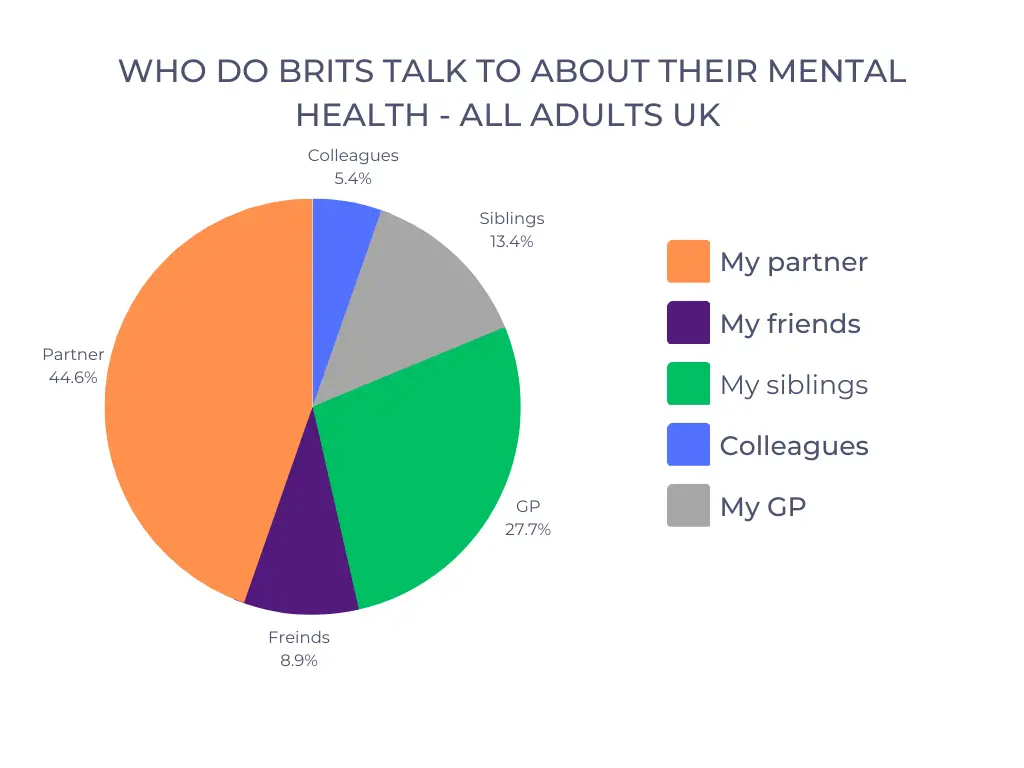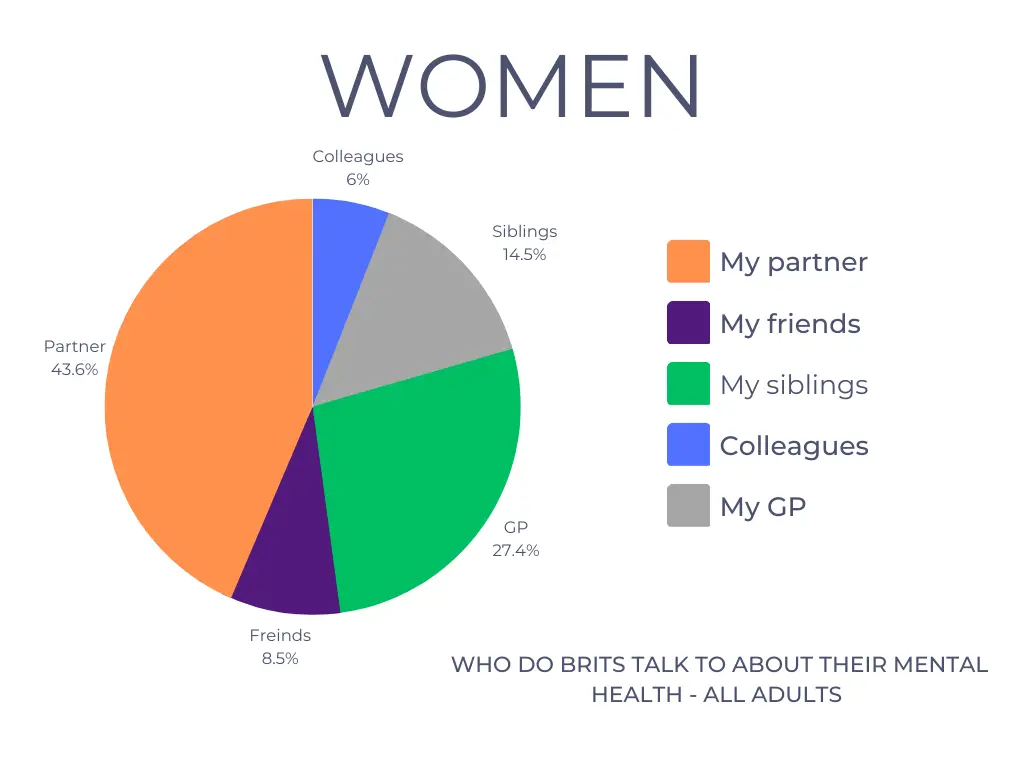
Over the years, mental health awareness has grown, and more people are now open to discussing their struggles.
However, it is crucial to understand who individuals feel comfortable talking to when they face mental health challenges.
This article aims to shed light on the trends in people’s preferences when choosing someone to confide in about their mental health issues, based on data collected between 2019 and 2023. Over 8000 people surveyed in the UK
The data reveals several interesting trends about who people choose to discuss their mental health struggles

Partners
Throughout the period, a consistent 47% to 51% of respondents chose their partners as their go-to person to discuss mental health concerns. This finding underscores the importance of trust and open communication in intimate relationships.
Close friends
Close friends were the second most popular choice for discussing mental health, ranging from 35% to 39% over the years. These figures highlight the value of close, supportive friendships in providing a safe space for such conversations.
General practitioners (GPs)
A significant percentage of people (29% to 43%) preferred talking to their GPs about mental health issues. This preference could be attributed to the trust in their professional expertise and the confidentiality of the doctor-patient relationship.
Therapists
Therapists were another popular choice, with 15% to 17% of respondents opting to consult them for mental health concerns.
This trend highlights the growing acceptance and normalization of seeking professional help for mental health issues.
Family members
Some respondents considered parents and siblings as confidants, with 13% to 19% choosing parents and 13% to 17% opting for siblings. This data suggests that for many, the family remains a reliable source of support during difficult times.
Colleagues, bosses, and anonymous helplines
A smaller percentage of people (4% to 11%) felt comfortable discussing their mental health with colleagues, bosses, or through anonymous helplines.
These numbers indicate that workplace support and anonymous resources still play a role in mental health conversations for some individuals.
Not talking to anybody
Unfortunately, 11% to 14% of respondents stated that they would not talk to anyone about their mental health struggles. This statistic reveals that there is still a need for increased awareness and resources to support those who feel they have no one to turn to.
In conclusion, the data suggest that partners, close friends, GPs, and therapists are the most popular choices for discussing mental health concerns.
However, there is still work to be done to ensure that everyone feels comfortable seeking help and support when they need it. Encouraging open conversations about mental health and reducing stigma are crucial steps in achieving this goal.
Gemma Drinkall from www.headsphere.co.uk said “When I am struggling with my mental health, my first place to go is my partner who understands my triggers and together we take steps to move me towards a better place.
When I experienced panic attacks and anxiety in teaching, I spoke to my GP before signing up for counselling, which has been a huge factor in improving my mental health over a long period of time. Now, I have the tools I need to support my own mental health day-to-day.”
Gemma Drinkall is an educational wellbeing coach and runs HeadSphere.


Encouraging Open Conversations and Reducing Stigma Around Mental Health
To foster an environment where everyone feels comfortable discussing their mental health struggles, we must actively work on encouraging open conversations and reducing the stigma surrounding mental health.
Here are some ways individuals, organizations, and society as a whole can contribute to this cause:
Normalize mental health discussions

Encourage open and honest conversations about mental health in everyday life. Share personal experiences, if comfortable, to show that seeking help and discussing mental health concerns is not a sign of weakness, but a part of self-care and personal growth.
Educate and raise awareness
Equip people with the necessary knowledge to identify mental health issues and provide appropriate support. Mental health awareness campaigns can be instrumental in promoting understanding and empathy.
Promote mental health resources
Ensure that individuals are aware of the available mental health resources, such as therapists, support groups, and helplines. Make this information easily accessible, and encourage people to seek help when needed.
Develop workplace mental health initiatives
Organizations can play a significant role in supporting employees’ mental well-being by implementing mental health initiatives.
Offering mental health workshops, providing Employee Assistance Programs (EAPs), and fostering a supportive work culture can make a significant difference in employees’ lives.
Encourage self-care and resilience

Help people understand the importance of self-care and resilience in maintaining good mental health. Promote healthy habits such as exercise, proper sleep, and stress management techniques.
Advocate for mental health policies
Support policies that improve access to mental health care, increase funding for research and services and provide mental health education in schools and communities.
Challenge misconceptions and stereotypes
Actively challenge and debunk myths and stereotypes about mental health issues. Correct misinformation and foster a culture of understanding and empathy.
Support local and national mental health organizations

Contribute time, resources, or funds to organizations working to promote mental health awareness, reduce stigma, and provide support to those in need.
By working together, we can create a world where discussing mental health is accepted and encouraged, and everyone has access to the support they need.
Let’s continue to break down barriers, raise awareness, and foster understanding to ensure that no one feels isolated in their mental health journey.


